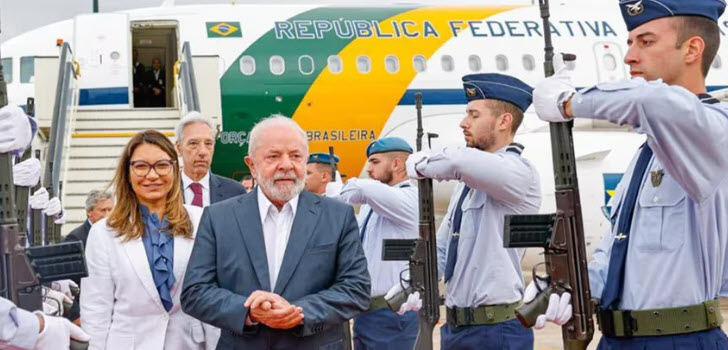(Opinion) Brazilian President Luiz Inácio Lula da Silva’s focus on foreign policy and his relentless schedule of foreign trips could distract him from tackling thorny domestic issues.
Two high-ranking allies of the left-leaning president told Reuters.
Their candid comments, made on condition of anonymity, point to growing unease in Lula’s camp about his travel pace and commitment to brokering peace between Russia and Ukraine at a time when pressure is intense to deliver results quickly or risk giving former President Jair Bolsonaro and his right-wing supporters an advantage.

According to Reuters, both sources welcomed Lula’s desire to show the world that Brazil was back after Bolsonaro damaged the country’s international reputation – but not at the expense of solving problems in the country.
One of the sources stressed that they had told Lula to focus more on addressing Brazil’s problems, as there was not much time left to achieve results and there was still much to do.
A poll last month by the Quaest/Genial polling firm found that 59% of Brazilians want Lula’s Workers’ Party to focus on national problems rather than his recent push to negotiate an end to the war between Russia and Ukraine, while 35% support the president’s conflict resolution plan.
Lula has long preferred to make his mark at international meetings.
But so far, less than six months into his third term, he has made twice as many foreign trips as he did at the start of his first presidency in 2003.
On Wednesday, a few days after returning from the coronation of King Charles III in London, the president will leave for the G7 summit in Japan – his sixth foreign trip since taking office in January, including trips to Beijing and Washington.
By comparison, Mexican President Andrés Manuel López Obrador, also a leftist, has made five foreign trips since taking office in 2018.
“This emphasis on the foreign agenda is wrong and will not help the government right now,” one of the sources, a senior presidential adviser, told Reuters.
“You have to focus on crucial issues,” the adviser said, referring to the need for higher economic growth and job creation.
Lula’s press office defended his record, pointing to higher social spending for poorer families, among other things.
“The focus is not only on foreign policy but also on a series of internal and external measures to free the country from the damage caused by the previous government,” it said.
Bolsonaro’s eschewal of diplomatic niceties and multilateral institutions and his disregard for the Amazon rainforest has meant that Brazil’s international reputation has been damaged in Western countries during his presidency.
At the same time, his anti-China rhetoric has infuriated Beijing.
However, Lula’s frequent travel has delayed decision-making when the economy has been sluggish.
The sources said the government has little room for maneuver after last year’s narrow election victory in which he defeated Bolsonaro with just 1.8% of the vote.
In the mid-April Quaest/Genial poll, Lula’s approval rating fell to 36% from 40% the previous month, including a notable nine percentage point drop in the poor northeast, a traditional bastion of his support.
Lula’s domestic situation is complicated by his minority government’s difficult relationship with the new conservative Congress, where some deputies complain that Lula cannot release funds from the pork sector to carry out his legislative agenda.
Marco Feliciano, a pro-Bolsonaro lawmaker in the lower house, said, “International travel is part of the president’s agenda, but not at the beginning of the government.”
“It is necessary to take care of the country and fulfill campaign promises.” Feliciano pointed out that Lula has accomplished virtually nothing domestically in five months because he has not won the legislature’s support.
“The right,” he added, “is united and working.” Lula needs congressional support for a new “fiscal anchor” to advance public finances without increasing Brazil’s national debt.
In addition, his presidential decree to create a dozen new ministries without parliamentary approval will expire in June.
But Lula is unwilling to delegate, overseeing his ministers and centralizing decision-making, which can be problematic, Barreto added.
Still, Lula has shown no signs of slowing down, with upcoming trips to the BRICS summit in South Africa in August, the United Nations General Assembly in September, and the G20 summit in New Delhi later this year.
News Brazil, English news Brazil, Brazilian politics

